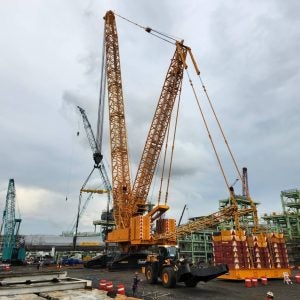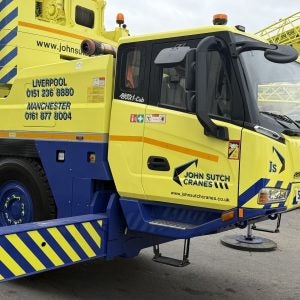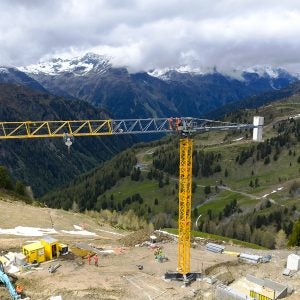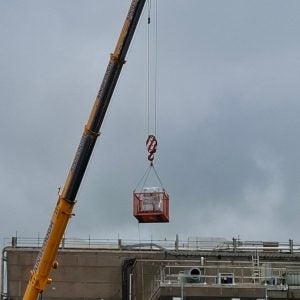In a world of forecasting and five-year plans, sometimes it’s good to be retrospective. In fact, it’s the lessons of the past that shape the future, says Richard Krabbendam, who plans to use his retirement to conduct seminars and pass on nearly four decades of knowledge and expertise to those with a future in this fascinating, challenging and dangerous industry.
Importantly, he says, “most accidents are down to human error.”
Krabbendam started his career 37 years ago after studying to be a mechanical engineer at the University of Technology in Delft. In 1973, he joined Big Lift in Dordrecht. “Six years later we booked a large contract with Aramco in Dahran, Saudi Arabia for all transport and lifting work for the NGL Facilities in Yanbu, on the Red Sea. This involved the transportation and lifting of petrochemical columns up to a maximum weight of 748t. Thereafter, we continued to carry out transport work for Aramco in the eastern province of Saudi Arabia. This contract was executed by the newly founded joint venture Alatas-Big Lift.
“By the end of 1979, Big Lift was taken over by Mammoet. Six months later, I cofounded International Transport & Rigging Engineering Consultants (ITREC) with a friend and colleague, Joop Roodenburg. After seven years, I decided to go back to the heavy lifting industry and an old client, Van Seumeren.”
ITREC worked often with Joop Roodenburg’s father Les Roodenburg’s crane builder Huisman. The elder Roodenburg completed his gradual takeover of Huisman in 1981, and the ITREC design business merged with the crane builder in 1987, shortly after Krabbendam had moved on to Van Seumeren.
In 1989, Jumbo Shipping approached Krabbendam with a view to setting up the Jumbo Land department, part of Jumbo Logistics, which takes care of the transport of heavy lifts from the vessel up to foundation. “I was responsible for the organisation and execution of complex lifting and transport projects; particularly in Malaysia, Indonesia and Thailand, but also Argentina, Denmark, Venezuela, America and India, among others.”
Krabbendam could be excused for taking a well-earned break, but when I conducted this interview he’d just returned from a two-day seminar in Turkey and by the time this is published, he will have completed a seminar and attended a trade fair in Australia. (His 65th birthday will also have been and gone).
Additionally, Jumbo Shipping is happy to keep him on, in a part-time basis for a further two years, giving them eight days service a month.
“I want people to benefit from my experience,” he says. “I don’t want to run the risk of leaving the industry behind me without passing on what I’ve learnt.”
So, with a series of videos, extensive presentations, flipcharts and photos, Krabbendam spreads his message through public and private seminars, with audiences ranging from company executives to riggers and crane operators.
These mini seminars and courses began when Krabbendam approached his seniors at Jumbo. “I told them I wanted to create an environment where people could come and learn from my knowledge and experience, but they were concerned my intention was to pass on trade secrets or methods that the company had used to be successful over competition.
“I explained that it wasn’t about company secrets, just information, and if some of the content carries the Jumbo brand then everyone’s a winner. And I’ve always thought that if you are prepared to share information, you’ll get more back in return.
“Eventually, they agreed to the model as I was proposing it and that’s how it begun. I had 200 participants spread over four private seminars in 2008 in Holland and abroad and did four other public seminars later that year. Last year, I put on 24 with more than 500 participants in total.
“They started in a one-day format but people found it was too much information in too short a space of time, so I increased it.
“My last two-day seminar was sold out and I’m planning courses now from March to June spanning geographies including Perth, Singapore, Dubai, Houston and Frankfurt. That’s in addition to private classes in China and Turkey.”
The latest chapter of this industry stalwart’s life in the industry represents something of a second attempt to engage the marketplace. “The first time I tried (while at ITREC) the industry wasn’t ready for it. The internet and the online resources and access to information it provides has meant people are more receptive to safety.”
There is still a difference in how safety is perceived though. “Sometimes those who’ve been practicing methods one way take some convincing that they should be paying more attention to safety.
“For me, I’ve always been of the opinion that safety is a good thing. Sure, anyone who‘s been in the industry as long as me would have been exposed to unsafe practice.”
“So,” I asked, “You’re lucky to be alive?” “It’s not fate or destiny,” Krabbendam replies, “But I see it as my duty to share my knowledge and try to improve safety in our industry. End users need things put in their terms. For example, I use learning tools that they can relate to; photographs of the equipment they use on a daily basis, for example. During my seminars, they can feel what an unstable load is, or why a trailer tips over. I use small-scale models to make them aware.
“My seminars are divided into categories and always begin with a general knowledge section, exploring the equipment (including cranes) that we’ll discuss. Then we look at moving heavy loads, using hydraulic platform trailers and SPMTs and lifting scenarios involving one, two or more cranes. Safety and the final chapter, ‘Accidents and how to avoid them’, attract a lot of attention.
“I don’t have people falling asleep in my classes, put it that way. But I am passionate about people going home safe to their families at night.”






